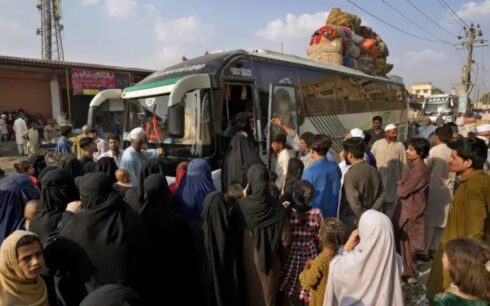Pakistan has forcibly deported more than 650 Afghan nationals in the past four days, as authorities accelerate the second phase of a controversial campaign to expel undocumented migrants.
According to Pakistani media reports, more than 140 Afghans were deported on Sunday, April 6, alone via the Torkham border crossing, while at least 50 others were detained in various parts of the country, including Islamabad, Rawalpindi, Karachi, Punjab and Khyber Pakhtunkhwa.
Officials say the crackdown includes house-to-house searches, arrests and forced removals, even targeting migrants who hold Afghan Citizen Cards (ACC), a form of identity recognized by Pakistani authorities.
Since the April 1 deadline for voluntary returns passed, the pace of deportations has intensified. In addition to the 650 people already expelled, nearly 800 Afghans have been detained and transferred to camps across the country.
Authorities have set up 52 temporary camps to process deportees, as police continue enforcement operations in Islamabad, Rawalpindi, Punjab, Karachi, Peshawar and Balochistan.
Despite calls from international human rights organizations to halt forced deportations, the Pakistani government has continued to pursue the removals. Critics say the operation violates international norms and puts returnees at risk.
“The forced deportation of Afghan migrants from Pakistan contradicts international law,” said Abdul Raziq Adeel, a human rights activist. “If the international community does not act, a humanitarian catastrophe will follow. These migrants face serious challenges and human rights risks upon return.”
Many deportees and rights advocates have called the expulsions unjust, particularly given the deteriorating security and humanitarian situation in Afghanistan.
“Afghan refugees in Pakistan are in a difficult situation,” said Zahra Ahmadi, a migrant in Pakistan. “The police are arresting and deporting people. This policy has had a serious impact, especially on children.”
“The arrests and deportations have intensified across Pakistan,” said Sakhi Saadat, a community activist. “This is deeply concerning. Many of these individuals will face major security and social challenges when they return to Afghanistan.”
According to estimates from migration agencies, roughly 3 million Afghans currently reside in Pakistan. Of those, 1.3 million hold official registration or refugee cards, while another 800,000 possess Afghan Citizen Cards. At least 1 million Afghans live in the country without documentation.
Rights groups have expressed concern that those with ACCs are now being prioritized for deportation, despite having previously been recognized under formal documentation programs.





